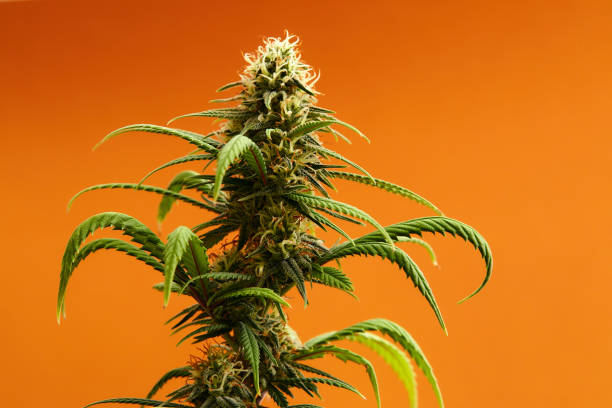
Cannabis is a cannabinoid drug that is made up of the plants and weeds, and it is often used for medical and non-medical reasons. A certain chemical is present in cannabis that affects the functions of the brain. The flowers and leaves of cannabis are dried first, then they are smoked and eaten directly for the psychoactive effects that affect the perception and mood of a person. Cannabis oil is extracted from the head and leaves of plants, which is a concentrated form of cannabis. It is a depressant drug that is used to reduce a person's brain activity.
Many people smoke cannabis as a treatment for chronic pain, multiple sclerosis, and various mental health conditions. Over the years, it has been suggested that cannabis is beneficial for the treatment of different conditions, and the benefits of smoking cannabis are discussed below.
According to research, cannabis is used for the treatment and management of chronic pain. Some patients with chronic issues reported that their pain is reduced by the use of cannabis. Medicinal cannabis can be particularly useful in reducing neuropathic pain.
Cannabis is associated with lowering blood pressure in humans as it reduces the resting blood pressure, along with the stressed blood pressure. The stress tests include mental arithmetic, isometric exercises, and the cold presser test.
According to some recent studies, cannabis is also used to treat diseases other than non-psychoactive diseases, which can effectively treat and prevent gastrointestinal disorders. The anti-inflammatory properties of cannabis have the property of reducing and preventing the symptoms of gastrointestinal disorders.
Cannabis helps people reduce their alcohol and drug addictions, as a separate correlation is found between the use of cannabis and the reduction in the use of alcohol. It reduces the cravings for alcohol and serves as a potential substitute for individuals.
Some evidence suggests that the use of cannabis is related to the relief of anxiety, depression, and post-traumatic stress disorder. It is found that it reduces the symptoms of intrusive thoughts, and the efficacy of cannabis in psychiatric disorders is well known and promising.
Medicinal cannabis can be used in the treatment of certain conditions, but these benefits come with several risks. It is essential to understand the negative effects of cannabis that are discussed below.
Smoking cannabis causes damage to the respiratory system and the blood vessels of the lungs, which leads to bronchitis. It also causes difficulty in breathing and results in complex respiratory issues. The use of cannabis contains several irritants and carcinogens that damage the airways of the lungs and increase the chances of chronic respiratory diseases.
The use of cannabis is more likely to increase short-term psychosis and long-term health conditions like schizophrenia. People who use cannabis regularly are more likely to experience suicidal thoughts. Cannabis also exacerbates the symptoms of bipolar disorder among people.
The use of cannabis impairs motor coordination and reaction time of the brain, and the effects of it are usually harmful and can become dangerous for a person when they are doing tasks like driving and operating machinery, which increases the chances of accidents.
The use of cannabis increases the chances of cardiovascular disease in a person because it elevates the heart rate for almost three hours after use. According to some studies, the use of cannabis increases the chances of stroke at some point in a person's life. The immediate effects of cannabis include an increase in a person’s heartbeat and, over time, a long-term impact on the cerebral functions.
The use of cannabis affects the cells of the human brain that are responsible for appetite, which generally report the fullness to the brain, which is why the ability of the brain to feel hunger is hindered because of this. The people face poor dietary changes, and this will lead to a condition of obesity and malnutrition. This affects the interaction of neurons and pathways that regulate hunger in people through specific mechanisms that depend on the dosage of cannabis.
According to the research, cannabis is used to help with chronic pain, nausea, and gastrointestinal disorders. Cannabis is used for research purposes to treat medical conditions in people. The cannabis-based oils are better tolerated than dried cannabis because inhaling this directly can cause lung diseases, so in this way, smoking cannabis is harmful, but using it in a medication form might be helpful. It is essential to take cannabis-based medication only after the prescription of healthcare professionals. The impact of cannabis depends on factors like potency and ratio of cannabis, methods of use, and the context of use. The medical use of cannabis, according to the prescription of healthcare professionals, has the potential to outweigh its negatives.
In conclusion, the individuals who are diagnosed with a certain condition can use medicinal cannabis and mainly in the non-smoked form. The act of smoking is itself harmful to the respiratory system. It is beneficial only when it is used for medicinal purposes, but if people use it without any purpose, the harmful effects can easily outweigh its positive outcomes. It is essential to use it in a balanced way after taking consent from healthcare professionals.

This post has been authored and published by one of our premium contributors, who are experts in their fields. They bring high-quality, well-researched content that adds significant value to our platform.


